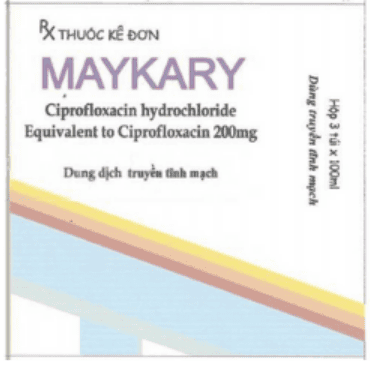This is an automatically translated article.
Promaquin medicine is used in the treatment of respiratory infections, ENT, urinary tract infections, gonorrhea, .... In addition to the above uses, this article will provide you with more information about the Promaquine side effects.
1. What is Promaquine?
Active ingredient: Ciprofloxacin Class: 2nd generation Quinolone and Fluoroquinolone antibiotics Legal group: ETC - (Ethical drugs, prescription drugs, Prescription only medicine) ATC code (Anatomical Therapeutic Chemical): J01MA02, S01AE03, S02AA15, S03AA07. Original brand name: CIPROBAY Brand name: Promaquin Manufacturer: Farmalabor-Produtos Farmacéticos, S.A Dosage form – Content: Ciprofloxacin: 500 mg Excipients: just enough
2. Uses of the drug Promaquin
2.1 Indications Promaquin is only indicated for severe infections for which conventional antibiotics do not work to avoid the development of bacteria resistant to ciprofloxacin: Upper and lower urinary tract infections; prostatitis ; osteomyelitis - myelitis; severe bacterial enteritis; Severe infections acquired in the hospital (bacteremia, immunocompromised people).
Prophylaxis of meningococcal disease and bacterial infections in immunocompromised people.
2.2. How to use - Dosage How to use:
Want the drug to be absorbed quickly, should take the drug 2 hours after a meal. Patients should be told to drink plenty of water and not to take anti-acid drugs within 2 hours after taking the medicine. The duration of treatment with promaquin 500 depends on the type of infection and the severity of the disease and should be determined according to the clinical and microbiological response of the patient. For most infections, treatment should continue for at least 48 hours after the patient is symptom-free. Duration of treatment is usually 1-2 weeks, but with severe infections or complications, longer treatment may be required. Ciprofloxacin treatment may need to be continued for 4-6 weeks or longer in bone and joint infections. Infectious diarrhea is usually treated for 3-7 days or may be shorter. Dosage:
Adults (Dosage for 24 hours)
Lower urinary tract infections: 100mg × 2 Upper urinary tract infections: 250 – 500mg × 2 Uncomplicated gonorrhea: 500mg, single dose Prostatitis Chronic paralysis: 500mg × 2 Skin, soft tissue, bone infections: 500 – 700mg × 2 Severe infectious enteritis: Treatment dose: 500mg × 2 Prophylactic dose: 500mg × 1 Prevention of meningococcal diseases: Adults and children over 20kg: 500mg, single dose Children under 20kg: 250mg, single dose or 20mg/kg Prevention of Gram-negative infections in immunocompromised patients: 250 - 500mg × 2 Infections Severe hospital, sepsis, treatment of infections in immunocompromised patients: Dose >= 500 mg x 2 should be reduced to 500 mg x 1 Need to reduce dose in patients with impaired renal function or function liver. In the case of people with impaired renal function, if the dose is low, it is not necessary to reduce the dose; If high doses are used, the dose must be adjusted based on creatinine clearance, or serum creatinine concentration.
3. Promaquine side effects
In general, ciprofloxacin is well tolerated. Side effects of the drug are mainly on the gastrointestinal tract, central nervous system and skin.
Common, ADR > 1/100:
Gastrointestinal: Nausea, vomiting, diarrhea, abdominal pain. Metabolism: Temporarily increased levels of transaminases. Uncommon, 1/1000 < ADR < 1/100:
Systemic: Headache, drug-induced fever. Blood: Eosinophilia, lymphocytopenia, polymorphonuclear leukopenia, anemia, thrombocytopenia. Cardio-pulse: Tachycardia. Central Nervous System: Excitement. Gastrointestinal: Digestive disorders. Skin: Rash, pruritus, superficial phlebitis. Metabolism: Temporarily increased serum creatinine, bilirubin and alkaline phosphatase. Musculoskeletal: Pain in joints, joint swelling. Rarely, ADR < 1/1000:
Systemic: Anaphylactic or anaphylactoid reactions. Blood: Hemolytic anemia, leukocytosis, thrombocytosis, changes in prothrombin levels. Central Nervous System: Convulsions, confusion, psychosis, paranoia, insomnia, depression, peripheral dysesthesia, visual disturbances including hallucinations, hearing disturbances, tinnitus, confusion taste and smell, increased intracranial pressure. Gastrointestinal: Pseudomembranous colitis. Skin: Skin-mucosal syndrome, vasculitis, Lyell's syndrome, erythema nodosum, erythema multiforme exudate. Liver: There have been reports of a few cases of hepatocellular necrosis, hepatitis, cholestatic jaundice. Muscle: Myalgia, inflammation of tendons (heel tendons) and surrounding tissue. There have been a few cases of tendon rupture, especially in the elderly, when used in combination with corticosteroids. Urogenital - Genitourinary: Crystalluria when urine is alkaline, hematuria, acute renal failure, interstitial nephritis. Other : Sensitivity to light with sun exposure, laryngeal or pulmonary edema, dyspnea, bronchospasm.
Inform the doctor about the unwanted effects encountered when using the drug.
4. Contraindications of Promaquin
People with a history of hypersensitivity to ciprofloxacin and related drugs such as nalidixic acid and other quinolones.
Ciprofloxacin should not be used during pregnancy and lactation, unless absolutely necessary.
5. Be careful when using Promaquin
Caution should be taken when using ciprofloxacin in patients with a history of seizures or central nervous system disorders, people with impaired liver or kidney function, people with glucose 6 phosphate dehydrogenase deficiency, people with myasthenia gravis. Long-term use of ciprofloxacin may cause overgrowth of bacteria that are not sensitive to the drug. It is essential to monitor the patient and make regular antibiotic charts to have appropriate treatment according to the antibiotic chart. Ciprofloxacin may cause tests for Mycobacterium tuberculosis to be negative. Ciprofloxacin may cause dizziness, lightheadedness, dizziness, and affect the ability to drive a vehicle or operate machinery. Limit the use of ciprofloxacin for young children and growing children (in experiments, the drug has caused cartilage degeneration in gravity-bearing joints). Effects of the drug on people driving and operating machines: Ciprofloxacin can cause dizziness, lightheadedness, dizziness, and affect the ability to drive a vehicle or operate machinery.
Use in pregnancy and lactation:
Warning rating AU TGA pregnancy category: B3 US FDA pregnancy category: C Pregnancy:
Ciprofloxacin should be used during pregnancy only in cases of bacterial infection In severe cases without alternative antibiotics, fluoroquinolones must be used. harmful to children. If the mother is forced to take ciprofloxacin, breastfeeding should be discontinued.
6. Instructions on how to handle ADR
To avoid crystalluria, maintain adequate fluid intake, avoid making urine too alkaline. If you have severe and persistent diarrhea during and after treatment, you may have a serious bowel disorder (pseudomembranous colitis). Ciprofloxacin should be discontinued and an appropriate antibiotic (eg, vancomycin) replaced. If there are any signs of side effects, ciprofloxacin should be discontinued and the patient should be treated in a medical facility, although these side effects are usually mild or moderate and resolve with discontinuation of ciprofloxacin.
7. Interactions with other drugs
Concomitant use of non-steroidal anti-inflammatory drugs (ibuprofen, indomethacin,...) will increase the side effects of ciprofloxacin. Concomitant administration of aluminum- and magnesium-containing antacids results in decreased serum concentrations and reduced bioavailability of ciprofloxacin. It is not recommended to take ciprofloxacin at the same time with antacids, it should be taken apart (should take the antacid 2 to 4 hours before taking ciprofloxacin) although this does not completely solve the problem. Absorption of ciprofloxacin may be halved if certain cytotoxic drugs are administered concomitantly (cyclophosphamide, vincristine, doxorubicin, cytosine arabinoside, mitozantron). If didanosine is used concomitantly, ciprofloxacin concentrations are significantly reduced. Ciprofloxacin should be taken 2 hours before didanosine or 6 hours after didanosine. Preparations with iron (fumarat, gluconate, sulfate) significantly reduce the intestinal absorption of ciprofloxacin. Preparations with zinc have less effect. Avoid concomitant use of ciprofloxacin with iron or zinc preparations or take these drugs as far apart as possible. Concomitant administration of sucralfate significantly reduces the absorption of ciprofloxacin. Antibiotics should be given 2 to 6 hours before taking sucralfate. Concomitant administration of ciprofloxacin with theophylline may increase serum theophylline concentrations, causing theophylline side effects. Blood theophylline levels should be checked, and theophylline dose may be reduced if two drugs are required. Concomitant administration of ciprofloxacin and ciclosporin may cause a transient increase in serum creatinine. Blood creatinine should be checked twice a week. Probenecid reduces glomerular filtration rate and tubular secretion, thereby reducing urinary excretion of the drug. Warfarin in combination with ciprofloxacin may cause hypoprothrombinemia. Blood prothrombin should be checked regularly and the dose of anticoagulants should be adjusted. Overdose and treatment:
If a large dose has been taken, it should be considered to apply the following measures: induce vomiting, gastric lavage, diuretic. Careful monitoring of the patient and supportive treatment such as fluid resuscitation is required. Storage:
Store in a dry place, protected from light, at a temperature below 30°C.
Please dial HOTLINE for more information or register for an appointment HERE. Download MyVinmec app to make appointments faster and to manage your bookings easily.













